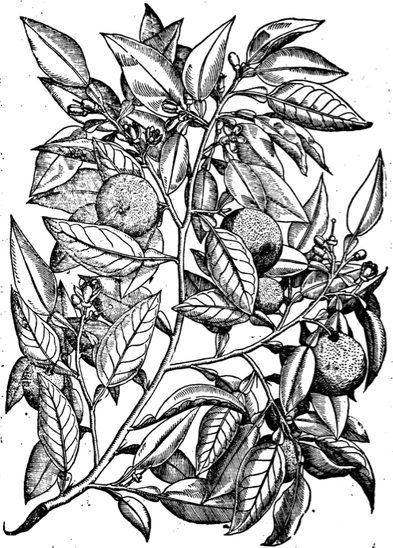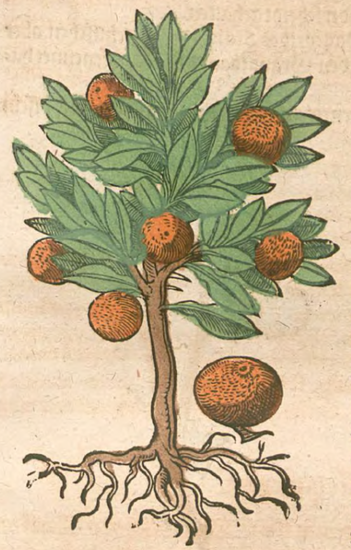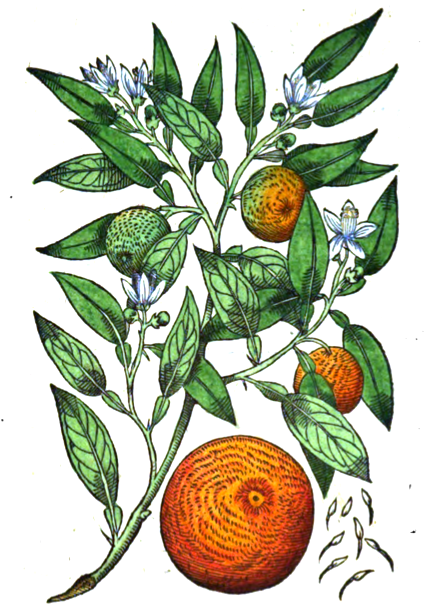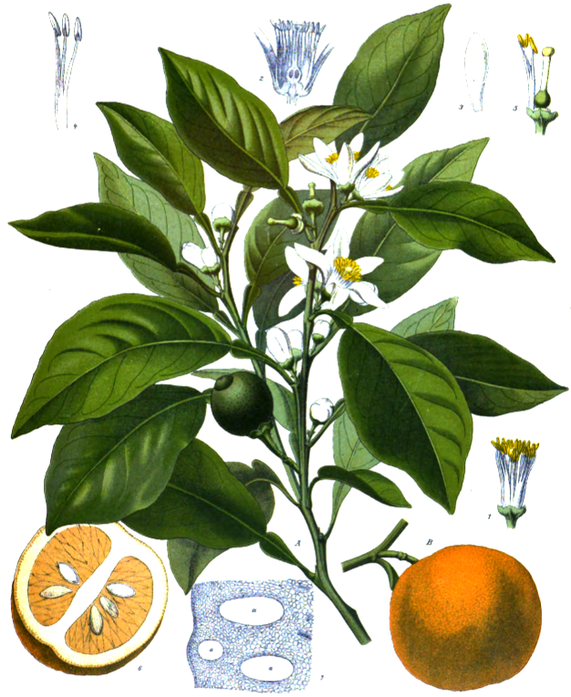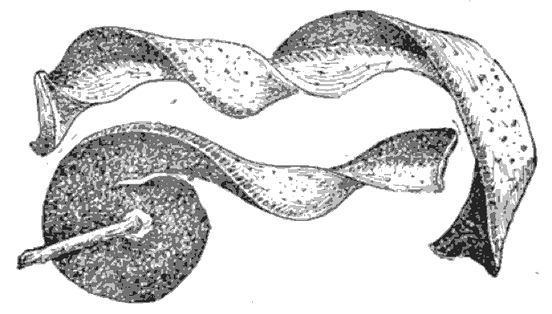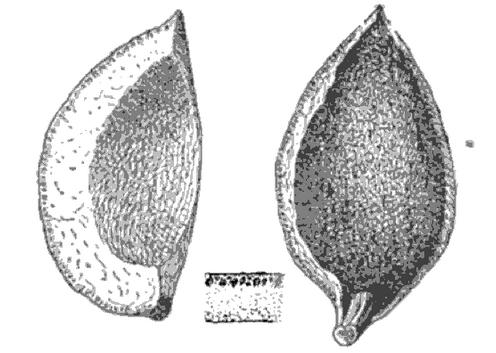Sentry Page Protection
|
New Kreuterbuch, Matthiolus, 1563
|
Krauterbuch, Lonitzer, 1578
|
Kreutterbuch, Matthiolus, 1586
Kohler's Medizinal Pflanzen, 1887
Bitter Orange peel: Left: in ribbons; Right: in quarters
Notes on Pharmacognosy, Otto Augustus Wall, 1902
Notes on Pharmacognosy, Otto Augustus Wall, 1902
Botanical name:
Citrus spp.
Sweet and Bitter Orange peels are used in Medicine.
Note Orange peel is used very similary to Tangerine peel
Parts used:
1. Peel (used similarly to Tangerine peel)
2. Mature Dried Bitter Orange Fruit Zhi Ke
3. Unripe Dried Bitter Orange Fruit: Zhi Shi
4. Mature Dried Orange Fruit: Zhi Qiao
5. Flowers
6. Seed
7. Leaf
Temperature & Taste:
Dried peel: Warm, dry. Bitter, aromatic; Fruit: Cool, moist, sweet
Classification:
2H. CARMINATIVES
3D. CORDIALS & CARDIACS. 3L. ANTI-TUSSIVE
4a. CEPHALIC. 4c. CARDIAC. 4e. STOMACHIC
Citrus spp.
- C. aurantium
- C. wilsonii is also used in TCM.
Sweet and Bitter Orange peels are used in Medicine.
Note Orange peel is used very similary to Tangerine peel
Parts used:
1. Peel (used similarly to Tangerine peel)
2. Mature Dried Bitter Orange Fruit Zhi Ke
3. Unripe Dried Bitter Orange Fruit: Zhi Shi
4. Mature Dried Orange Fruit: Zhi Qiao
5. Flowers
6. Seed
7. Leaf
Temperature & Taste:
Dried peel: Warm, dry. Bitter, aromatic; Fruit: Cool, moist, sweet
Classification:
2H. CARMINATIVES
3D. CORDIALS & CARDIACS. 3L. ANTI-TUSSIVE
4a. CEPHALIC. 4c. CARDIAC. 4e. STOMACHIC
Uses:
ORANGE PEEL:
1. Warms the Stomach, clears Damp, moves Qi:
-Colic, poor appetite, nausea, vomiting, belching, bloating;
-warms and strengthens a cold or damp Stomach
2. Clears Damp, Promotes Urine
-Edema, fluid retention from Damp
3. Clears Phlegm, Stops Cough:
-as with its Chinese cousin, Tangerine peel, used for Cold-Phlegm Cough and obstruction of Phlegm in the Chest.
4. Warms the Heart, Resists Poison (West):
-protects Heart from Poison
-Heart Yang deficiency
DRIED ORANGE FRUIT (Zhi Ke):
1. Moves the Qi:
-abdominal distention
-Chest oppression and congestion
-used similarly to Orange peel, but is milder
IMMATURE ORANGE FRUIT (Zhi Shi):
1. Breaks Up Qi, Resolves Stagnation:
-indigestion, abdominal fullness and distention
-resolve Food Stagnation
-abdominal hardness and masses
-one of the strongest Qi moving herbs
2. Clears Damp, Resolves Phlegm:
-Cold Phlegm obstructing the Chest with chest pain and oppression, shortness of breath
-Phlegm obstruction with poor appetite and fatigue
ORANGE BLOSSOM:
1. Moves Qi and Blood, Promotes Menstruation:
-Difficult and painful Menstruation; also for profuse Menstruation
-Prolapse, retroversion of the Uterus
-Ulcers, Polyps, Fibroid Tumors of the Uterus or Ovaries
-Conserve of Orange flower was also used for fibroid tumors of the breast
2. Moves the Qi, Calms the Mind:
-nervousness, anxiety, depression
-distilled water of Orange flowers was a favorite of French women to promote calm and peaceful sleep
-an infusion of green Orange buds is also taken before bed to promote sleep
Dose:
Orange Peel, Orange Fruit and Immature Orange Fruit are all used in similar doses.
Peel, Fruit or Immature Fruit in Powder: 1–3 grams
Peel, Fruit or Immature Fruit in Decoction: 3–9 grams
Flowers: 1–2 teaspoonfuls in infusion; 1–2 spoonfuls of the distilled water.
Preparation:
The Fruit or Immature dried fruit can be stir-fried to enhance its warm nature while reducing the strong Qi dispersing effect. This makes them equally good to warm the digestion, benefit the Stomach and resolve Damp while being less draining of the Qi.
Comment:
Orange peel has been used in East and West. TCM is particularly fond of medicines derived from the Citrus, a number of different medicines being supplied by this family, all being carminative medicines used to regulate the flow of Qi.
1. Bitter Orange Zhi Ke is Cold, Bitter and Pungent. It moves Qi, relieves distention, stops Cough and moves the Bowels.
2. Unripe Bitter Orange Zhi Shi is Cold, Bitter and Pungent. It is used similarly to Zhi Ke above, and is more commonly used.
3. Ju Pi and Chen Pi are the dried peels of Orange and Tangerine respectively, the latter being aged which is stronger in effect. These names can be used for either Orange or Tangerine but typically Ju Hong refers to Orange, Ju Pi to Tangerine, and Chen Pi to aged Tangerine peel. These are the most commonly used Citrus medicines in TCM which are used to regulate Qi, warm the Stomach, clear Damp, resolve Phlegm and stop Coughs. They are primary medicines to clear Damp from the Digestive system in particular.
4. Because these medicines move and disperse Qi, they consume Qi if used for too long or in too large a dose. So in cases with Qi deficiency they are always combined with Qi tonics, and in reality in most cases they are combined with Qi tonics to tonify Qi while activating the same to relieve stagnation.
Orange Peel, Orange Fruit and Immature Orange Fruit are all used in similar doses.
Peel, Fruit or Immature Fruit in Powder: 1–3 grams
Peel, Fruit or Immature Fruit in Decoction: 3–9 grams
Flowers: 1–2 teaspoonfuls in infusion; 1–2 spoonfuls of the distilled water.
Preparation:
The Fruit or Immature dried fruit can be stir-fried to enhance its warm nature while reducing the strong Qi dispersing effect. This makes them equally good to warm the digestion, benefit the Stomach and resolve Damp while being less draining of the Qi.
Comment:
Orange peel has been used in East and West. TCM is particularly fond of medicines derived from the Citrus, a number of different medicines being supplied by this family, all being carminative medicines used to regulate the flow of Qi.
1. Bitter Orange Zhi Ke is Cold, Bitter and Pungent. It moves Qi, relieves distention, stops Cough and moves the Bowels.
2. Unripe Bitter Orange Zhi Shi is Cold, Bitter and Pungent. It is used similarly to Zhi Ke above, and is more commonly used.
3. Ju Pi and Chen Pi are the dried peels of Orange and Tangerine respectively, the latter being aged which is stronger in effect. These names can be used for either Orange or Tangerine but typically Ju Hong refers to Orange, Ju Pi to Tangerine, and Chen Pi to aged Tangerine peel. These are the most commonly used Citrus medicines in TCM which are used to regulate Qi, warm the Stomach, clear Damp, resolve Phlegm and stop Coughs. They are primary medicines to clear Damp from the Digestive system in particular.
4. Because these medicines move and disperse Qi, they consume Qi if used for too long or in too large a dose. So in cases with Qi deficiency they are always combined with Qi tonics, and in reality in most cases they are combined with Qi tonics to tonify Qi while activating the same to relieve stagnation.
Main Combinations:
ORANGE PEEL:
1. Warms the Stomach, move Qi, for Abdominal discomfort, nausea, loss of appetite:
i. Orange peel with fresh Ginger
ii. Orange peel with Calamus
iii. Orange peel with Blessed Thistle, Centaury, Gentian
iv. Orange peel with Balm, Gentian
v. Orange peel with Elecampane and Licorice
vi. Orange peel with Centaury, Myrrh, Zedoary
vii. Orange peel with Lemon peel, Camomile, Centaury, Blessed Thistle, Mint, Yarrow, Calamus, Angelica, Lesser Galangal, Zedoary, Costus, Nutmeg, Aniseed, Fennel seed. (Pharmacopoeia Generalis, 1783)
2. Carminative: Orange peel, Lesser Cardamon, Fennel seed, Caraway seed, Camomile, Mint, Balm, Rosemary, Sage (Formulaire Magistral et Memorial Pharmaceutique, 1823)
3. Spasm and pain of the Stomach or Intestines, combine Orange peel with Costus
4. Stomach weakness with bloating, discomfort, combine Orange peel with Elecampane, Fennel seed, Licorice
5. Jaundice, Unripe Orange (2), Saffron (1 dram), White Wine (2 pounds). Macerate, Dose: 4 spoonfuls. (Formulaire Magistral et Memorial Pharmaceutique, 1823)
DRIED ORANGE FRUIT (Zhi Ke):
1. Chest congestion, Orange fruit (Zhi Ke) with Platycodon Jie Geng.
2. Itchy skin, Orange fruit (Zhi Ke) with Saposhnikovia Fang Feng, Paeonia rubra Chi Shao Yao
IMMATURE ORANGE FRUIT (Zhi Zi):
1. Chest pain from Cold Phelgm and Heart Yang deficiency (Coldness), Immature Orange fruit (Zhi Shi) with Cinnamon twig (Gui Zhi), Trichosanthes Semen Gua Lou Ren. (as in Zhi Shí Xie Bai Gui Zhi Tang)
2. Abdominal fullness and distention from Phlegm obstruction, Immature Orange fruit (Zhi Shi) with Magnolia Hou Po, Pinellia Ban Xia, Atractylodes Bai Zhu.
3. Food stagnation, Immature Orange fruit (Zhi Shi) with Hawthorn (Shan Zha) and Malted Barley (Mai Ya)
4. Cholecystitis, Immature Orange fruit (Zhi Shi) with Scutellaria Huang Qin, Pinellia Ban Xia, Bupleurum Chai Hu
5. Uterine prolapse, Immature Orange fruit (Zhi Shi) with Motherwort seed (Chong Wei Zi). This was used as a decoction for 30 days with 83% effectiveness. (Chen & Chen)
ORANGE BLOSSUM:
1. Depression related to menstruation, Orange flower, with St. John's wort, Balm, Yarrow
2. To calm the Mind and Nerves, mild Depression or Anxiety:
i. Orange flower with Linden flower
ii. Orange flower with Valerian
iii. Orange flower with Camomile, Lavender, Rose
iv. Orange flower with Balm, Peppermint
Major Formulas:
Orange Peel:
Compound Infusion of Orange Peel
Compound Infusion of Gentian
Powder for Epilepsy (Bicker)
Powder for Hysteria
Powder for After-pains (Lemery)
Powder of Plantain Compound
Uterine Powder (Species Hysterica)
Ointment for Hemorrhoids
Dried Bitter Orange fruit (Zhi Ke)
Cang Fu Dao Tan Tang
Chai Hu Shu Gan San
Ge Xia Zhu Yu Tang
Hao Qin Qing Dan Tang
Hui Chun Dan
Ji Chuan Jian
Mu Xiang Bing Lang Wan
Ping Xiao Capsules
Qing Zao Run Chang Tang
Ren Shen Bai Du San
Run Chang Wan
Shu Gan Tang
Wu Ji San
Xing Su San
Xue Fu Zhu Yu Tang
Yi Yin Jian
Green Orange Peel (Qing Pi)
An Shen Zhen Jing Er Shi Pian
Ge Hu Jie Cheng San
Hai Zao Yu Hu Tang
Mu Xiang Bing Lang Wan
Qing Zao Run Cheng Tang
Shu Gan Tang
Tian Tai Wu Yao San
Xia Ru Yomg Quan San
Zhou Che Wan
Immature Orange (Zhi Shi)
Da Chai Hu Tang
Da Cheng Qi Tang
Bao Tan Tang
Di Tan Tang
Huang Lian Wen Dan Tang
Huang Long Tang
Ju He Wan
Ma Zi Ren Wan
Qing Qi Hua Tan Wan
Si Ni San
Si Wu Ma Zi Ren Wan
Wen Dan Tang
Xiao Cheng Qi Tang
Zhi Shi Dao Zhi Wan
Zhi Shi Gua Lou Gui Zhi Tang
Zhi Shi Xiao Pi Wan
Zhi Shi Xie Bai Gui Zhi Tang
Zhi Zhu Wan
Zhi Zi Hou Po Tang
Cautions:
1. The peel is drying, so it not suitable for Yin deficiency.
2. Caution during Pregnancy. Peel, Dried Fruit and Immature Dry Fruit should all be used cautiously during Pregnancy, especially the Immature Fruit which is strongest.
Main Preparations used:
Water of the Flowers, Juice of the Sour Oranges, Syrup of the Sour Orange Juice, Candied Orange Peel, Conserve of the Flower, Electuary of the Peel, Distilled Oil of the Peel
1. The peel is drying, so it not suitable for Yin deficiency.
2. Caution during Pregnancy. Peel, Dried Fruit and Immature Dry Fruit should all be used cautiously during Pregnancy, especially the Immature Fruit which is strongest.
Main Preparations used:
Water of the Flowers, Juice of the Sour Oranges, Syrup of the Sour Orange Juice, Candied Orange Peel, Conserve of the Flower, Electuary of the Peel, Distilled Oil of the Peel
Click the Tabs above for more information on this Medicine
|
'The orange was unknown to the ancient Greeks and Romans; and its introduction to Europe is due to the Arabs, who, according to Gallesio, appear to have established the tree first in Eastern Africa, Arabia, and Syria, whence it was gradually conveyed to Italy, Sicily, and Spain. In the opinion of the writer just quoted, the bitter orange was certainly known at the commencement of the 10th century to the Arabian physicians, one of whom, Avicenna, employed its juice in medicine.
There is strong evidence to show that the orange first cultivated in Europe was the Bitter Orange or Bigarade. The orange tree at Rome, said to have been planted by St. Dominic about A.D. 1200, and which still exists at the monastery of St. Sabina, bears a bitter fruit; and the ancient trees standing in the garden of the Alcazar at Seville are also of this variety. Finally, the oranges of Syria (ab indigenis Orenges nuncupati) described by Jacques de Vitri, Bishop of Aeon (ob. A.D. 1214) were acidi seu pontici saporia. |
The Sweet Orange began to be cultivated about the middle of the 15th century, having been introduced from the East by the Portuguese. It has probably long existed in Southern China, and may have been taken thence to India. In the latter country there are but few districts in which its cultivation is successful, and the Bitter Orange is hardly known at all. The name it has long borne of China or Portugal Orange indicates what has been the usual opinion as to its origin. It probably alludes more exactly to a superior variety brought about 1630 from China to Portugal.
One of the first importations of oranges into England occurred in A.D. 1290, in which year a Spanish ship came to Portsmouth, of the cargo of which the queen of Edward I. bought one frail of Seville figs, one of raisins or grapes, one bale of dates, 230 pomegranates, 15 citrons, and 7 oranges ("poma de orenge"). (Pharmacographia, Fluckiger & Hanbury, 1879) |
For a general History of the Citrus family, see Lemon


